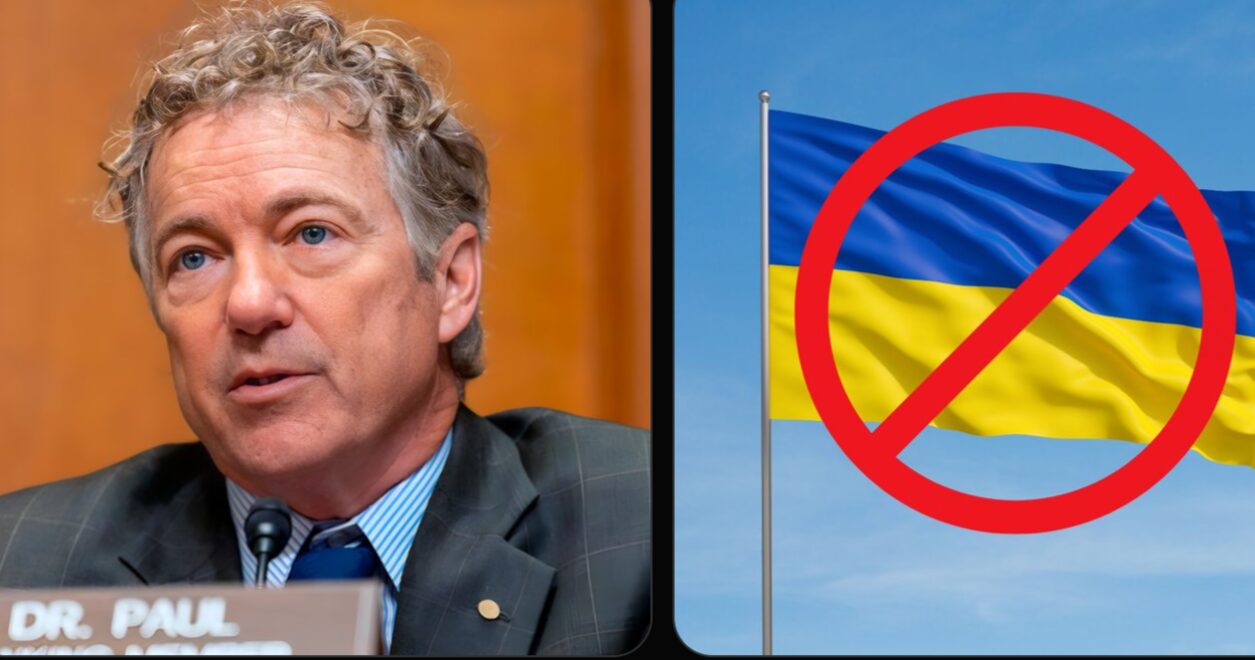Senator RAND PAUL CONDEMNS $4.8 MILLION in taxpayer dollars that was spent on “Ukrainian influencers.”
Senator Rand Paul Condemns $4.8 Million in Taxpayer Dollars Spent on “Ukrainian Influencers”
In a move that has sparked controversy, Senator Rand Paul has condemned the U.S. government’s expenditure of $4.8 million in taxpayer dollars to fund “Ukrainian influencers.” The Kentucky Republican, a staunch critic of foreign aid and government spending, has raised concerns about the allocation of U.S. taxpayer money to support social media personalities in Ukraine at a time when many Americans are grappling with economic challenges at home.
Senator Paul’s remarks come amid the ongoing conflict between Ukraine and Russia, during which the U.S. has provided substantial military, economic, and humanitarian aid to Ukraine. However, this latest revelation about U.S. taxpayer dollars being directed toward influencer marketing has ignited a broader debate about the priorities of U.S. foreign aid and the use of government resources in the context of international relations.
The Controversial Spending: What Is Behind the $4.8 Million?
The $4.8 million spent on Ukrainian influencers is part of a larger initiative funded by the U.S. government and implemented by the U.S. Agency for International Development (USAID). The goal of the program was to support Ukraine’s information and communications efforts by enlisting social media influencers to spread messages of support for Ukraine’s sovereignty, counter Russian disinformation, and promote Ukrainian culture and values.
Influencers, who are often popular social media figures with large followings, were hired to create content that would resonate with both domestic and international audiences. The campaign sought to amplify Ukraine’s narrative on platforms like Instagram, TikTok, Twitter, and YouTube, where these influencers often have millions of followers. The idea was that the reach of these influencers could help boost global awareness of Ukraine’s fight against Russia, generate support for Ukraine, and counter Russian propaganda that has been circulating on social media.
While the campaign was intended to build international solidarity for Ukraine, critics, including Senator Paul, argue that the decision to allocate taxpayer dollars for influencer marketing is an inappropriate and wasteful use of funds. Many are questioning whether the program represents a legitimate strategic priority or if it reflects broader issues with the U.S. government’s handling of foreign aid.
Senator Rand Paul’s Criticism
Rand Paul, who has long been critical of U.S. foreign aid and government spending, wasted no time in calling attention to the $4.8 million expenditure. In a statement, Paul argued that spending taxpayer money on Ukrainian influencers was a gross misuse of resources, especially when American citizens are facing financial hardships.
Paul emphasized that the U.S. government should be prioritizing domestic issues, such as inflation, economic recovery, and reducing national debt, rather than funding international social media campaigns. He pointed to the fact that while millions of Americans are struggling with rising living costs, the government is allocating vast sums to foreign projects that might not align with the needs of the American public.
Senator Paul’s critique is part of his broader political philosophy, which advocates for fiscal conservatism and a reduction in government spending on foreign interventions. He has often questioned the effectiveness and transparency of U.S. foreign aid, particularly in regions where the outcomes of such assistance are difficult to measure. Paul has also been a vocal critic of the U.S. involvement in the Ukraine conflict, calling for a more restrained foreign policy approach that focuses on American interests rather than foreign entanglements.
The Broader Debate: U.S. Foreign Aid and National Priorities
Senator Paul’s condemnation of the spending on Ukrainian influencers is part of a larger ongoing debate in the U.S. about the role of foreign aid and its alignment with American priorities. Over the past year, the U.S. has committed billions of dollars in aid to Ukraine, providing military assistance, economic support, and humanitarian relief. While much of this aid is aimed at helping Ukraine defend itself against Russian aggression, the expenditure of taxpayer dollars for non-military initiatives, such as the influencer campaign, has raised questions about the scope and efficacy of foreign assistance.
Critics of U.S. foreign aid argue that the U.S. should focus more on domestic issues, including infrastructure, healthcare, and social programs, before spending money abroad. Some believe that foreign aid often leads to unintended consequences, including dependency on U.S. funding and a lack of accountability in how funds are used. The Ukrainian influencer campaign, in particular, has been criticized for being a questionable use of government resources in a time when American citizens are facing significant economic challenges, including inflation and a rising cost of living.
On the other hand, supporters of U.S. aid to Ukraine argue that the country is facing an existential crisis and that providing financial support, including for initiatives like the influencer campaign, is a way to bolster global democracy and counter Russian disinformation. They argue that U.S. foreign aid plays a critical role in advancing American strategic interests, promoting human rights, and supporting global stability.
The $4.8 million spent on Ukrainian influencers highlights the tension between these two perspectives. For some, it represents a necessary tool in the modern information age—an innovative way to combat disinformation and support Ukraine’s narrative in the digital realm. For others, it is emblematic of a broader problem of U.S. government overspending and a lack of focus on issues that directly affect American citizens.
The Use of Influencers in Modern Diplomacy
The use of social media influencers in diplomacy and international relations is not entirely new. Over the past decade, governments and organizations have increasingly turned to influencers to help amplify messages, especially on social media platforms where younger audiences are highly engaged. Governments have recognized the power of influencers to shape public opinion, especially in areas where traditional media may be less influential.
For Ukraine, the use of influencers has been part of a broader strategy to win the “information war” with Russia. The Russian government has used disinformation extensively, both to shape domestic opinion and to influence international perceptions of the war in Ukraine. By enlisting influencers with large followings, Ukraine and its supporters hoped to counter Russian narratives, build support among young people globally, and ensure that the Ukrainian perspective was heard in a crowded digital landscape.
While this strategy has its merits, the question remains whether it justifies the use of taxpayer dollars. The line between public diplomacy and marketing is increasingly blurred, and the debate over how to allocate resources for these efforts is likely to continue.
The Future of U.S. Foreign Aid and Global Influence
As the U.S. continues to navigate its role in global geopolitics, the issue of foreign aid—both military and non-military—will likely remain a contentious topic. The decision to spend $4.8 million on Ukrainian influencers highlights the complexities of modern diplomacy and the challenges of prioritizing resources effectively.
Moving forward, the U.S. government will have to address questions about how to balance domestic needs with foreign obligations. The debate over this spending underscores the growing divide between those who advocate for increased foreign engagement and those who argue that the U.S. should prioritize its own citizens first.
While foreign aid plays an important role in global diplomacy and security, the allocation of funds, especially for unconventional initiatives like influencer campaigns, will continue to be scrutinized. As Senator Rand Paul’s criticism suggests, the U.S. taxpayer will likely demand more transparency and accountability regarding how their hard-earned dollars are spent, both at home and abroad.
Conclusion: A Divisive Issue
The $4.8 million spent on Ukrainian influencers has sparked a fierce debate about U.S. foreign aid and the priorities of government spending. While some view the campaign as a necessary tool in the fight against Russian disinformation, others, like Senator Rand Paul, see it as a waste of taxpayer resources. As the U.S. continues to navigate its role in Ukraine and the wider world, the tension between supporting international causes and addressing domestic challenges will remain a central issue in U.S. foreign policy. The debate over this spending reflects a larger conversation about the role of government in managing both national and international priorities in an increasingly interconnected world.

















Post Comment